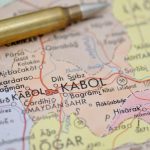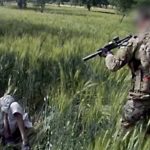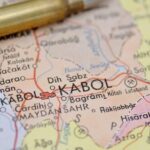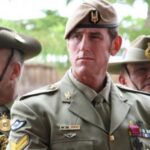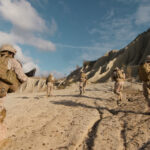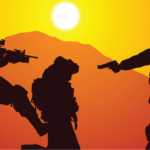“A War for Money”: Peace Activist Greg Rolles on the Australian Abandonment of Afghanistan
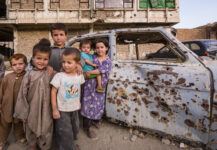
Right now, the US is fixing to pull all of its troops out of Afghanistan by 11 September. Whilst Australia withdrew its remaining troops by 18 June.
And as the invasion commenced in October 2001, this conflict marks our nation’s longest war, and potentially, its most futile.
The invasion began a month after the 9/11 terror attacks in New York. The Bush administration’s and the Howard government’s pretext for invading the war-torn country was to flush out the terrorists flourishing under Taliban rule.
However, as allied forces withdraw, the Taliban is now regaining huge tracts of land to the point that on 9 July, the Islamist movement – that governed the Central Asian nation for five years prior to invasion – boasted it’s now in control of 85 percent of the region.
Our nation solidified its abandonment of Afghanistan, and the government it helped prop up over the last two decades, when it decided to not only withdraw its troops, but to also disband the Australian embassy in Kabul.
Soldier turned peace activist
Greg Rolles is a prominent Australian peace activist, who, at the time our nation and the US commenced the invasion of Afghanistan, was a recruit in the Australian Defence Forces undergoing basic training.
From there, Rolles went on to officer training at the Australian Defence Force Academy in Canberra. However, he left the army once the 2003 invasion of Iraq commenced, realising that “we weren’t the good guys” in the Middle Eastern conflict.
In 2014, Rolles was involved in a nonviolent direct action that took place on Victoria’s Swan Island, where an ASIS installation is situated.
Four activists, including Rolles, were apprehended by defence force personnel, and they later claimed they were then hooded, stripped naked and dragged along the ground.
Washed their hands
This week, retired ADF army major Stuart McCarthy, who served in Afghanistan, burnt his service medal to protest the Australian government not extending asylum to dozens of Afghan civilians that helped our country’s forces during the war.
While the ABC reported on Wednesday that foreign minister Marise Payne is inclined to keep some personnel present in Afghanistan to monitor the resurgence of the Taliban following our nation’s complete pull out.
However, whilst the minister has indicated this inclination, she has made no firm plans as to whether any such move will take place. And these rumours are circling at a time when Australia’s abandonment of the region is coming under high scrutiny.
Sydney Criminal Lawyers spoke to former ADF soldier and prominent peace activist Greg Rolles about the reasons why the prolonged conflict was instigated, the findings of the Brereton report, as well as our nation’s targeting of China as the new enemy now it’s discarded its old foe.

The US and its allies, including Australia, invaded Afghanistan in October 2001, just a month after the September 11 attacks in New York.
At the time, the Taliban ruled, and the invasion was ostensibly about its having let the country become a hotbed for terrorist organisations, including al-Qaeda.
However, another much cited reason was that the Bush administration proposed to run a pipeline through the region so western markets could access oil from the Caspian Basin.
Greg, in your opinion, why did the US invade Afghanistan? And further, why did our country follow?
My memory is that the Taliban offered to hand over any al-Qaeda people in return for the US not invading, which is a deal the US refused. So, clearly, this war was for economic reasons.
But, as much as they wanted to extract fossil fuel and rare earth materials, there was also the pressure from the arms industry. So, people were offering deals, as they could make money out of war.
It’s no good having the world’s greatest arsenal if you can’t drop bombs and make money out of it.
So, it was pressure from the arms industry. It was the revolving door lobby between politicians, the arms industry and the military, who all wanted to make money out of a large-scale war.
The war in Afghanistan has been a disaster for the Afghan people.
Australia followed because our foreign policy and our arms industry are tied to that of the United States.
So, I don’t think anyone can say it was about stopping terrorism. We saw an increase in terrorism after the invasion of Afghanistan. This was a war for money.
I was in the army at the time. I was in basic training when September 11 happened. It was sold to the soldiers as a war that was defending Australia.
But no one could make the link between how going to Afghanistan had anything to do with protecting people from Australia.
No one knew how to talk about that. We just believed there was a general Asian threat and we had to somehow go and stop that from happening.
As the US withdraws its troops from the two decades-long war, and Australia has completed the same process, the Taliban has been regaining great areas of land.
What does this say about the last 20 years of our nation’s involvement in the Central Asian region?
The Australian government owes an explanation to the families of the soldiers who were killed over there, the soldiers who were injured and those who returned traumatised and unable to function.
We were sold on the belief that firstly this war was about stopping terrorism. And once it became clear that it wasn’t, we were told that we were going to rebuild Afghanistan.
A quick reading of history shows that any intervention to shape a nation-state always fails and never works.
So, Australia spent a lot of its taxpayer money, as well as a lot of human blood and toil, and all we have done is made a mess of the place.
The Australian government owes an explanation to the families of Australian ex-servicemen and women, who have made the ultimate sacrifice to go to that war.
This was not a war about protecting Australia. This was a war about profits for the few, at the expense of the lives of Australian soldiers and their wellbeing.
There are a number of Australian Afghan veterans speaking out about the federal government’s lack of action in evacuating Afghan locals who assisted our troops whilst they were deployed to the region.
The US is about to fly out a potential 70,000 Afghans who assisted its forces. But while the Morrison government has suggested it shouldn’t leave people who helped our nation over there, it’s taking no action to evacuate around 100 interpreters.
What are your thoughts on our government’s treatment of these people?
We have a responsibility. If we’re going to invade a country and make a mess of it, then we need to look after the people who looked after us.
However many interpreters or people that worked for us, we have a responsibility to grant them humanitarian protection visas, as we have a responsibility to all people fleeing dangerous situations.
This is particularly with Australia as we invaded a country with no legal context, so we must look after people who looked after us over there.
Released last November, the Brereton report recommended that 36 incidents allegedly carried out by Australian SAS troops in Afghanistan be investigated for potential criminal prosecution. It also found the SAS was operating under a warrior culture.
How do we account for our nation’s troops acting in this way? And despite the report suggesting otherwise, do you think those higher up the chain of command were aware that this was taking place?
When I was in basic training, September 11 happened. The training then very quickly changed to language with racist overtones – “The sand diggers are coming over the hill and you need to be able to load your weapon properly.”
The Australian military has a culture within it that is propagated and nourished by the Australian government that sees the enemy as the Other, which is perceived as dangerous and bad compared to us.
This culture is what’s propagated in the army. The Australian military trained closely with the Joint Special Operations Command in the US, and this culture of torture to get any answer possible out of people has been widespread amongst all areas of operations that special forces have been involved in.
We know that peace activists, myself included, were subjected to torture on Swan Island, where the SAS conducted some of their training. That happened in 2014.
It has been long known that this is how the SAS conducts itself and carries out these operations. And this was nurtured and encouraged by the Australian higherups because it was perceived as getting results.
It was also an incredibly hard war to see who the enemy was. My understanding is Afghan leaders switched their allegiance – as anyone would – depending on economic factors and who was perceived as winning.
So, figuring out who the enemy was, and who Australia could point its big guns at, was actually a really hard task, and this was frustrating when there’s a culture of wanting to go and kill the enemy overseas.
This became an outlet for Australian soldiers: to torture and brutalise innocent Afghan civilians who simply got in the way of our rage.
The higherups definitely knew about this. I would say, many of them actually encouraged it, because it was seen as getting results, or it was seen as men doing a hard job just letting off steam.
And as a result, Australia broke its own moral code, as well as international law.
None of us should be surprised. And higherup officers who knew about this should be ashamed, should resign and should be held accountable for letting traumatised soldiers run wild in someone else’s country.
The UN Refugee Agency warned last week of a looming humanitarian crisis in Afghanistan due to escalating conflict. Around 270,000 Afghans have been displaced since January, and civilian casualties are rising.
How would you say this reflects on the withdrawal of the western allies?
Over the last few weeks, a number of prominent Afghan politicians have stepped up to say that the US invasion of Afghanistan was not good for women.
We hear about a few successful women. But many of the poorer and lower-class women and children didn’t benefit.
Around 12,000 people a year were starving to death in Afghanistan. That’s not counting those who died from the bombs being dropped and drone warfare.
It has been nothing but violence for 20 years, and this is just a continuation. This is the cost of war.
We wage these wars so that arms manufacturers and fossil fuel companies can reap a profit and it’s the everyday people of Afghanistan who have to pay the price.
This is nothing new. It has been the same with every foreign intervention or invasion that has happened since 1945.
We need to pay heed to this, so that next time our leaders beat the drums of war for any other cause, we don’t follow.
We need to find another way to solve our differences without bombing poor people, otherwise the same thing is going to happen over and over. And it’s going to affect all of us.
Following on from what you just said, my last question is as the Australian government has just pulled out of the 20 year war, it’s announced a pivot to the Indo-Pacific region, where China is being conveyed as the new threat.
Indeed, Morrison, Dutton and Joyce have all been publicly posturing against Beijing.
So, Greg, after two decades of the war on terror, where are you expecting this new venture will take the country?
I’m very fearful of where this new venture will take the country. For some reason, the US oligarchy is beating the drums of war against China.
Then you also have Christopher Pyne, a man who was Australia’s defence minister, walking straight into a lobbying job with the Australian arms industry. And he’s now giving speeches at universities, saying to expect a war with China in the next ten years.
This is the most disastrous posturing simply for the profit of a few arms companies.
I’m quite scared that we’re going to end up with an engagement in the Pacific that’s against China, which will also be against the interests of the Australian people, simply because some rich people in the US and Australia want to make money out of selling guns to the government.
This is horrible. In a time of climate collapse and the refugee crisis that the world’s facing, we need to be taking resources away from this constant war-making and posturing and start solving our problems diplomatically, not violently.
China has not made any threats about wanting war. It’s only the west that has been beating the drum. China has simply been responding to US encirclement.
We need to remember that China is Australia’s biggest trading partner. We have a lot in common with China. And yes there are differences, but we can work them out.
We need to remember that Australia and the US aren’t perfect in how they treat people.
We should be looking at how we treat First Nations people, refugees, and people living with disabilities, before we let a few ideological differences with China lead us into a disastrous war that’s going to be bad for everyone.


